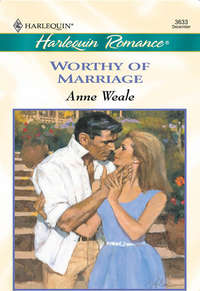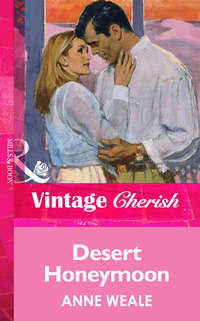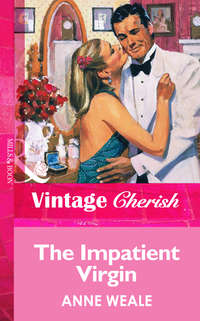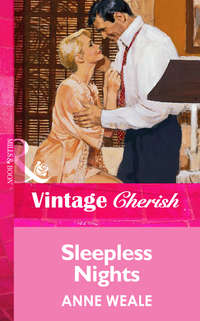
Полная версия
The Youngest Sister

“Already I feel very beholden to you.” Letter to Reader Title Page CHAPTER ONE CHAPTER TWO CHAPTER THREE CHAPTER FOUR CHAPTER FIVE CHAPTER SIX CHAPTER SEVEN CHAPTER EIGHT CHAPTER NINE CHAPTER TEN Copyright
“Already I feel very beholden to you.”
“There’s no need. You’re actually doing me a favor.”
“I don’t understand.”
“It’s been a long time since I had any female companionship. I hadn’t expected to find myself sitting here with a beautiful woman beside me so soon after my arrival.”
The way he talked, Cressy could almost believe she was beautiful. But she knew it had to be a line. She would only ever be a beauty to a man who loved her, and she couldn’t delude herself that someone like Nicolas had fallen in love at first sight. Neither had she—had she?
Dear Reader,
Many readers like to know how a story came to be written. This one was inspired by Ca’n Xenet, an old farmhouse in rural Majorca, which was given new life when it was bought by Shiela Peczenik, an artist, who made it her home and that of her painting school.
Although writers avoid using real people in their stories, for A Touch of the Devil (published 1980), which some of you may have read, I drew on my son’s experiences in the Spanish Foreign Legion to create a hero who had also been a legionnaire. Similarly, much of what I know about men like the hero of this story derives from my husband’s passion for mountains. While I was painting in Majorca, he was walking the Pennine Way and planning a trip with our son to the summit of Aconcagua, the highest peak in the Western Hemisphere.
In creating exciting heroes, it helps to be the wife and mother of men who do adventurous things. Had our first home not been in the wilds of “upcountry” Malaysia, I might never have written any romances, and certainly not Winter is Past, the one that launched me on a long and satisfying career as a storyteller.
Best wishes,
Anne Weale
The Youngest Sister
Anne Weale

www.millsandboon.co.uk
CHAPTER ONE
USUALLY when Cressy Vale travelled by air it was on the cheapest charter flight available.
Today she was flying business class on Centennial’s scheduled service because the journey was urgent and all the ordinary seats on airlines serving the island of Majorca were fully booked.
It was late June, a popular month with people who wanted to avoid the crowds of the high season as well as the more intense heat of the Mediterranean in July and August. This was the perfect time to go to the beautiful island off the east coast of Spain where the Spanish royal family spent their summer holidays.
Cressy was not going for pleasure, but to answer an SOS message that an elderly member of her father’s family, who had retired to Majorca, was in trouble.
Her flight to Palma, the island’s capital, took off at nine-thirty. By twelve-forty, Spanish time, she would be in golden sunshine instead of the cold, wet weather which had persisted since Easter in England.
Cressy lived and worked in London. On the train from Victoria station to Gatwick airport, she was one of a number of young people travelling in casual clothes with their belongings in rucksacks and roll-bags. But she wondered if, at the airline’s business class check-in desk, she would be conspicuously out of place in her jeans and faded indigo cotton sweater.
Her jeans were freshly laundered and the sweater had been expensive when her sister Anna had bought it. But now it was three years old and had undergone several repairs. Even her dark blue deck shoes had once been in Anna’s wardrobe. Both her sisters spent a lot of money on clothes, but they earned more than she did and needed to dress well for their jobs and their non-stop social lives. Cressy was saving for an expensive group trip to the Galápagos Islands, a sanctuary for rare wildlife in the Pacific. She felt lucky to have a family who supplied her with top-quality hand-me-downs.
However, when she reached the check-in any fears that she might be made to feel like a bag lady at a gala ball were driven out of her mind by the sight of the person being checked in ahead of her. When her questing glance dropped from the sign above and behind the desk to the tall figure standing in front of it, she stopped dead in her tracks.
Never in her life had she seen such a gorgeous male back-view.
For a moment her heart stood still, the way it had the first time she saw the soaring white summit of the Jungfrau on a family holiday in Switzerland.
The Jungfrau was there for ever. In a hundred years’ time it would still be stopping the hearts of impressionable schoolgirls. But any minute now the man she was looking at would finish his business at the desk and she would see his face. The probability was that his front wouldn’t match his scrumptious rear.
Bracing herself for the inevitable let-down, she savoured the brief illusion that here was the kind of man she had always dreamed of meeting—and not merely a fellow traveller in the same teeming airport, but actually going where she was going.
He was tall, the top of his head at least six inches above her own, with shoulders to match, and long, powerful but shapely brown legs exposed by very short shorts. But they weren’t the beach shorts of someone going on a sand, sun and sangria holiday. These were the serviceable shorts worn by trekkers, and this particular pair had seen a lot of service. As had his leather boots.
Above the waist he was wearing a dark blue cotton shirt with the sleeves rolled up high over deeply tanned elbows and the kind of biceps and forearms that could hoist their owner up a rock face more easily than most people climbed stairs.
His black curly hair was long and would have flowed over those impressively wide shoulders if it hadn’t been neatly bound by a length of black tape. Midway down the rim of one ear there was a glint of silver.
Cressy knew what it was because she had one herself, at home, in the miniature chest of drawers where she kept her few bits of jewellery. It was a little silver climbing figure. Hers had come from a market stall selling strings of turquoise beads and earrings of lapis lazuli. She wore it as an open-backed ring, but if the man in front of her was a rock climber he would regard rings as a hazard. Curled round the rim of his ear, the silver climber was less likely to catch on something.
For some moments she feasted her eyes on every visible detail of him, from the upright muscular shoulders, lean hips and hard male backside to the strong but elegant legs which, for a man with black hair, were not as furry as dark men’s legs usually were.
She was jolted out of her trance by being jabbed on the backs of her own legs. Before she turned round she knew what had caused the painful thrust—the front bar of the baggage trolley of someone behind her.
The woman in charge of the trolley was an ash-blonde, forty-something, in a pastel suit with a lot of gold jewellery and a matched set of expensive suitcases. Without a word of apology, she said, ‘This is the business class queue.’
‘I know. I’m in it,’ said Cressy
‘Then why are you hanging back here? The desk’s free,’ the woman said abruptly.
Had Cressy’s mother or either of her sisters been addressed in that tone, they would have made a cutting retort about bad manners. But Cressy had a high threshold of tolerance. If people were rude, she assumed they were under stress. It might be that the woman was secretly terrified of flying. Surprisingly many people were.
As Cressy turned back towards the desk, no longer blocked by the tall man, she glanced in the direction she would be going in after check-in. She was just in time to catch a glimpse of him loping gracefully out of sight, leaving her with an impression of a long, elastic stride and a body in peak physical condition.
But she still didn’t know what his face was like.
Nicolas settled his tall frame in one of the comfortable chairs in the business class departure lounge and downed half a glass of chilled orange juice from the courtesy bar in one long, refreshing swallow.
He had taken a copy of The New York Herald Tribune from a selection of newspapers on a table near the door, but he didn’t start reading it. After months in the back of beyond he had long since broken the habit of following world events and was in no hurry to resume it.
Instead he glanced round the lounge at his fellow passengers, but none held his eye for more than a second. They were the usual mixed bag of pallid-faced businessmen travelling on expense accounts and well-to-do middle-aged to elderly couples returning to their retirement villas in the expatriate colonies that were dotted round most of Majorca’s coastline.
Not that everyone in the lounge was bound for the same destination. Centennial didn’t have its own lounge, but shared it with various other small airlines.
He was about to turn his attention to the front-page headlines when someone unexpected made an uncertain entrance.
At first he thought she must have come in by mistake and would be redirected by the stewardess on duty at the desk. But after a brief conversation the newcomer nodded and smiled, and came towards the non-smoking end of the lounge where he was sitting. Having chosen a seat, she divested herself of her backpack, which was small enough to be stowed in an overhead locker on whichever plane she was catching. Then she went to the self-service bar, where coffee was waiting on a hotplate alongside a comprehensive range of alcoholic drinks, the appropriate mixers being stored in two glass-fronted fridges under the counter.
Although she carried herself well, Nicolas had the impression that the girl was inwardly self-conscious, feeling herself out of place in this quiet and softly lit enclave of cosseted comfort so different from the hurly-burly endured by tight budget travellers.
She looked to be about nineteen and, in an era when teenagers’ role models were either as thin as starved cats or built like greyhounds with implanted breasts, her figure was unfashionably Amazonian.
He watched her dropping ice cubes into a glass before filling it from the jug of orange juice. Barefoot, she would be about five feet nine or ten. A big girl in every sense. But her curves were firm and well-proportioned, and would be a cuddly armful. He had never been attracted by delicate, doll-like women.
She returned to her place, stepping carefully around the outstretched legs of a sleeping transit passenger who was relying on the stewardesses to wake him in time for his next flight. Her hair was light mouse with blonde streaks. But they were like children’s blonde streaks, not the result of expensive sessions at the hairdresser. Her face appeared bare of make-up. She looked an open-air girl, which was also how he liked them. Except she was too young, and probably not going where he was anyway.
At a different time of year Nicolas would have put her down as a chalet girl, bound for a winter of cooking and cleaning for skiing parties. Assuming her interests to be sporting, he wondered what she would look like stripped off except for a minuscule swimsuit, speeding across the water on a windsurfer.
His train of thought was broken when, after looking round the lounge as he had a few minutes earlier, the girl met his eyes and realised he had been watching her.
For a second or two she was visibly disconcerted, and then a delicious blush suffused that clear outdoor skin and she turned her face towards the door. Her shyness amused and intrigued him. Even at nineteen not many girls were flustered by a stranger’s stare. In his experience, the signal he had been sending—albeit not deliberately—was usually returned with tacit permission for him to make the next move.
Cressy set her glass down on the table alongside her chair and, bending forward, pretended to be looking for something in one of the pockets of her backpack.
She hadn’t expected to find the dark man staring at her, but that wasn’t why she felt agitated. She was in a dither because his face had not been the let-down she had anticipated. It was extremely attractive. More than that, it was a face she had often tried to visualise but never quite succeeded in putting together in her mind—the face of her dream man.
Like a police detective composing an Identikit picture, she had often mentally assembled the various facial characteristics she expected him to have. A firm mouth and chin. A nice smile. Eyes both intelligent and kind. But somehow, like an Identikit, the face she had seen in her mind’s eye had never been more than an approximation of her ideal.
To be suddenly confronted by the real thing, the genuine article, took a bit of getting used to. Had it been a trick of the soft light from the silk-shaded table lamps? If she looked again would the illusion vanish?
Certainly, in that brief moment of eye contact, the impression she had registered hadn’t been one of kindness and niceness. She had felt the same sort of frisson she would have expected to feel on finding herself within yards of a magnificent but dangerous wild animal.
Even his impressive back-view hadn’t prepared her for that extraordinary face—the tanned skin stretched tautly over a bone structure that seemed to belong to the chieftain of a remote mountain kingdom somewhere in wildest Asia rather than here in Europe where, in her observation, real men had almost died out.
She wanted to look at him again, but she didn’t dare in case he was still watching her. She calmed herself with the thought that it was most unlikely they would be sitting together.
Half an hour later, when she found that they weren’t, she was perversely disappointed. They were seated in the same row but she had been allocated the window seat on the port side and he had the other window seat, with an elderly couple next to him. On Cressy’s side of the aisle there was only one seat next to hers and its occupant hadn’t shown up yet.
Some passengers were still boarding when those in the business class section were offered a choice of orange juice or champagne. Cressy decided to stay with orange juice. When the aircraft took off the seat next to hers was still empty.
No sooner was the plane airborne and the No SMOKING sign switched off than the dark man rose from his seat with a polite, ‘Excuse me, please,’ to his neighbours.
Cressy assumed he must want to go to the loo. But, after waiting for the others to resume their seats, he looked down at her and said, ‘Would you mind if I joined you? This airline doesn’t have a no smoking policy, and I don’t want to spend the flight behind a chain smoker.’
Following the direction of his nod, Cressy saw the top of Forty-something’s candy floss hairdo and a spiral of smoke.
‘Not at all,’ she said politely, but without the friendly smile she would have given to anyone else making the request.
As he sat down next to her she was aware of the same inner turmoil she had felt in the lounge. From the pouch on the back seat she took out the in-flight magazine and put on a show of becoming deeply immersed in it.
Even in business class Nicolas found the leg room inadequate, but he was used to enduring far worse discomforts. The girl’s aloof manner amused him. He guessed it was caused by shyness. Shy girls were rare nowadays. He sensed that the one beside him, pretending to be absorbed in the magazine, was a throwback to his mother’s generation. As his mother had, she smelt delicious. The scent was one he didn’t recognise, a delicate, flowery fragrance which didn’t invade the nostrils like the heavy stuff worn by the blonde in front of his previous seat.
A Spanish stewardess distributed menus and another took orders for pre-lunch drinks. Expecting the girl to ask for another orange juice, he was mildly surprised when she ordered Campari and soda, her manner unexpectedly decisive. He liked the sound of her voice and the size and shape of her hands. He didn’t like women whose bones felt as fragile as those of small birds when he shook hands with them. Nor, when making love, did he like having long nails drawing blood on his back. The girl’s nails were short and clear-varnished. She was wearing a gold signet ring on the fourth finger of her left hand. She could have bought it in an antique shop because the crest appealed to her. It could mean she had something serious going with a boyfriend. Or it could be a family heirloom.
As the man beside her ordered a gin and tonic Cressy was aware that the pretty Spanish stewardess, her slender figure set off by a navy skirt and white blouse with red and blue stripes on the revers of the collar, was making it clear that she fancied him.
Well, who wouldn’t? thought Cressy, sneaking a glance at the long length of rock-hard brown thigh parallel with her own leg.
She studied the four-course menu, written in Spanish and English, wondering what Nebraska-style meant in relation to salmon pâté with palm heart sticks and baby corn cobs.
She wasn’t a strict vegetarian but, like a lot of her friends, she no longer ate meat when she had any choice in the matter. She wouldn’t be choosing the veal tournedos. The alternative was a mixed-meat kebab with pilaf rice, peas and Parisienne carrots, whatever they were. She would eat the rice and vegetables, leave most of the kebab and fill up with cheese and fruit, which were shown as two separate courses.
After their drinks had been brought to them, with the usual sachet of peanuts, the man beside her said pleasantly, ‘May I open the packet for you?’
Although the bags were famously difficult to open, Cressy was taken aback by the gallantry of his offer. Big girls like herself were widely regarded as being able to fend for themselves in every respect. Even ultrafeminine babes like the doe-eyed stewardess weren’t being overwhelmed with chivalry these days. In the words of a guy Cressy knew, most men had taken so many putdowns from women who read sexism into every wellmeant gesture that they had given up doing all that stuff their mothers had taught them. If women wanted to be equal, he’d said, that was fine by him. He would go on being nice to old ladies, but anyone else could open doors for themselves, change their own wheels and pay for their own meals.
‘Oh...would you...? Thank you,’ she said, handing over the peanuts.
The brief contact with his fingers as the packet changed hands sent a strange tingle up her arm. She had had several boyfriends, none of them serious, but couldn’t remember ever being as strongly aware of their physical presence as she was now with this stranger.
Having opened the packet and put it back on her tray-table, he said, ‘Are you on holiday?’
‘No, I’m not. Are you?’
‘I live on the island.’
‘Really? What do you do there?’
‘I relax and recharge my batteries. My job involves a lot of travelling. When I’m at home I sit in the sun and vegetate.’
She was about to enquire what his job was when he beat her to it by asking, ‘If not a holiday, what takes you to the island?’
‘I’m going to see my great-aunt.’
‘Have you stayed with her before?’
She shook her head. ‘I’ve never been to Spain at all.’
‘Where on the island does your relative live?’
‘I’m not entirely sure,’ Cressy admitted.
Had this been a holiday, she would have read a guidebook before coming away. There hadn’t been time to do that. She had only the common knowledge that Majorca was the largest island in a group called the Balearics—one of which, Ibiza, had once been a mecca for hippies, and possibly still was.
‘The house is called “Es Vell”. It’s somewhere near a town called Pollensa,’ she told him.
‘That’s up north, nowhere near Palma airport. Will there be someone meeting you?’
Again Cressy shook her head. ‘Aunt Kate doesn’t know I’m coming. She’s a bit of a recluse. It was her Spanish neighbour who let us know she was ill. She rang up yesterday afternoon. Luckily the person who took the call speaks some Spanish, so she could make out roughly what was being said. Aunt Kate has broken her leg. At seventy-eight that’s serious.’
He lifted an eyebrow. ‘Wasn’t there anyone older who could have come out to take charge?’
‘How old d’you think I am?’
‘Eighteen? Nineteen? Rather young to cope with the situation you’ve outlined...especially if you don’t speak Spanish.’
‘I’m twenty-three,’ Cressy said briskly. ‘And, apart from not speaking Spanish, I can probably cope a lot better than some people twice my age. I work for Distress Signal, an organisation which specialises in dealing with domestic emergencies.’
‘I’ve heard of it, but I would have thought they’d be staffed by sensible middle-aged ladies, not girls who could pass for teenagers.’
‘They’re staffed by a wide range of people...of both sexes,’ Cressy informed him. ‘Normally a situation like this one would be dealt with by someone Spanish-speaking. But in this case, when there’s a close relation who can come to the rescue, that’s obviously preferable to employing an outsider.’
‘If you’ve never been to Spain before, and your aunt is a recluse, it doesn’t sound as if the relationship between you is a close one.’
‘No, it isn’t,’ she conceded. ‘But I do know a lot more about her than a stranger would. At one time she and my parents had a good relationship. But then she went off to the Mediterranean and they gradually drifted apart. My parents lead very full lives—and they’d rather go to France for their holidays. My mother wilts if it’s too hot.’
As she spoke she wondered why she was confiding in him. Chatting to strangers had always been one of her foibles. When she was younger, her lack of caution in making friends had been a worry to her elders—especially to Maggie, who’d run the house while Mrs Vale was busy helping to run the country from the House of Commons. Cressy had lost count of Maggie’s warnings that talking to strangers could be hazardous. But that had been when she was younger and less competent to judge whether people were trustworthy or not.
‘How long have you worked for Distress Signal?’ he asked.
‘Two years. What do you do?’
‘I’m a freelance journalist and travel writer. If you ever read travel articles you may have seen my by-line... Nicolas Alaró.’
Her eyes widened in astonishment. She had read a lot of his pieces. He had been to all the places she would have liked to visit. Sometimes she cut out his articles and filed them away against the day when she might meet a suitable travelling companion and take off on a round-the-world trip. She didn’t fancy going alone, which was why she was going with a group to the Galágapagos Islands.
The last clipping she had filed had been about an expedition on a yacht called Endless Summer, sailing the channels of Patagonia.
“‘Alaró” sounds Spanish, but you don’t write as if English was your second language. Are you completely bilingual?’
With his black hair and tanned olive skin, he could pass for a Spaniard in some ways. But his eyes weren’t brown, they were dark indigo-blue—the colour her sweater had been before many washings had faded it.
‘I had a Mallorquin grandfather who left me his house on the island. I also use his name for working purposes. My real surname is Talbot...and you are?’
‘Cressida... usually called Cressy.’
Deliberately, she didn’t mention her surname. He might connect her with her mother. She was proud of her mother’s achievements but she had learnt a long time ago that Virginia Vale was either admired or loathed, and he might be one of the loathers. Many men were.
She said, ‘Travel writing must be a marvellous way to earn a living. I enjoyed your piece about the voyage on Endless Summer.’







